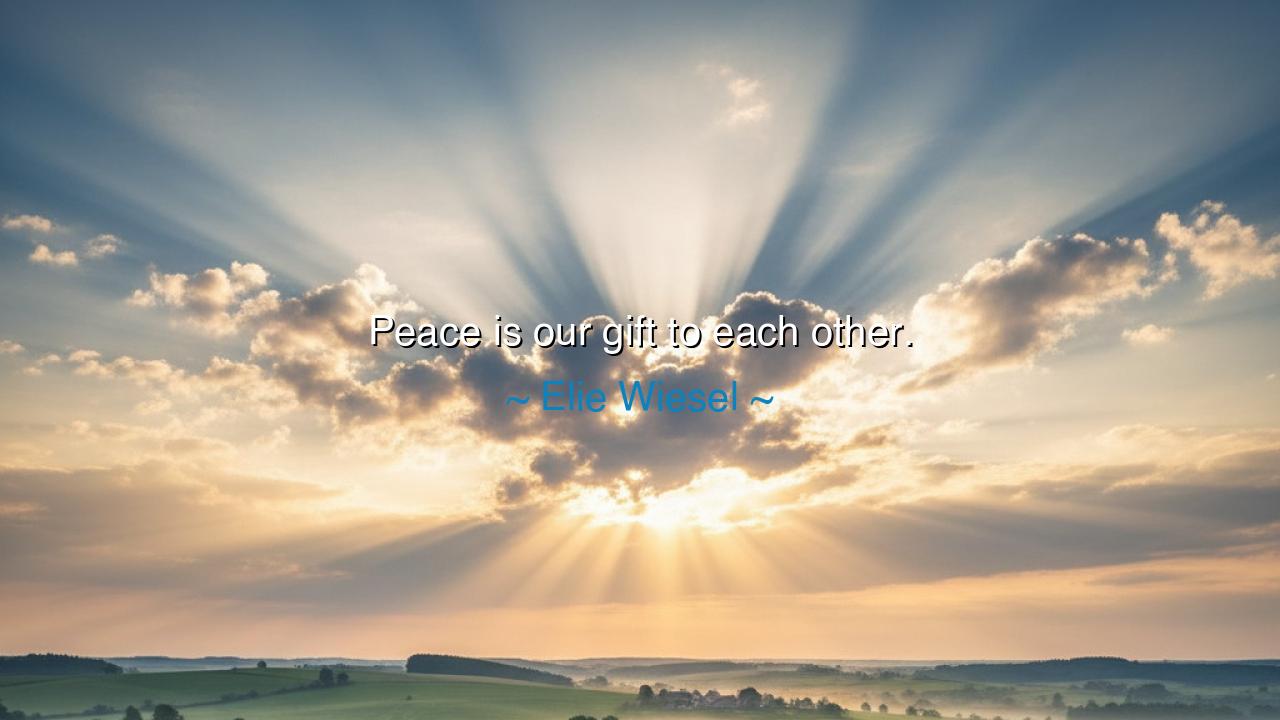
Peace is our gift to each other.






Hear the words of Elie Wiesel, survivor, witness, and teacher, who emerged from the abyss of human cruelty with a heart still yearning for light: “Peace is our gift to each other.” This utterance is not mere sentiment—it is a commandment born of suffering, a truth carved from the ashes of war and despair. To Wiesel, who had walked through the darkness of the Holocaust, peace was not abstract—it was the rarest treasure, a flame that, once kindled, must be guarded and given from one soul to another.
The meaning here is profound. Peace is not granted by kings alone, nor secured merely by treaties signed in halls of power. It is a gift, one that each human being may extend to another, in word, in deed, in presence. Like bread broken at a common table, it must be shared, for if one hoards it, the blessing dies. True peace is mutual, reciprocal, and alive only when it flows between hearts.
Consider the story of Nelson Mandela, who, after twenty-seven years in prison, walked free not with vengeance but with forgiveness upon his lips. South Africa stood at the edge of civil war, its people torn apart by hatred. Mandela could have chosen bitterness, yet he offered instead the gift of peace—not demanded, not forced, but given. By extending this gift, he invited even his oppressors to step into a future unchained from the past. His life revealed that peace is not weakness but the highest act of strength, the power to rise above pain and create harmony where none existed.
Wiesel’s words also remind us of the fragile nature of this gift. It is not like gold or stone, enduring without care. It is like a flower that must be tended. A harsh word, a hardened heart, a clenched fist—these can wither it in an instant. Yet a kind gesture, an outstretched hand, a moment of listening—these can make it bloom again. To live without peace is to live in chains; to give peace is to free not only the other but also oneself.
For the ancients knew: war and hatred consume, but peace multiplies. When two enemies meet in reconciliation, they do not merely end their conflict—they create a wellspring from which future generations may drink. It is as if Wiesel whispers across time: “What you offer your brother or sister is not just calm for today, but a legacy for tomorrow.” Thus, peace is both present gift and future inheritance.
Reflect, O seeker: do you not hold such power in your own life? You may not command armies nor sign treaties, yet every day you choose whether to give the gift of peace to those around you. In your family, you can offer forgiveness instead of anger. Among friends, you can speak reconciliation instead of division. Even to strangers, your patience, your courtesy, your restraint are gifts of peace that ripple outward in unseen ways.
The lesson is this: do not wait for leaders or distant powers to deliver peace. Begin with yourself. Cultivate peace in your words, in your thoughts, in your dealings with others. When wronged, offer forgiveness; when misunderstood, seek understanding; when tempted by rage, choose gentleness. These small acts are mighty, for when woven together they form the great fabric of a peaceful world.
And so let these words echo in your heart: “Peace is our gift to each other.” Give it freely, guard it dearly, and pass it onward like a sacred torch. For in this gift lies not only the healing of wounds but the hope of all humankind.






TLThu Thao Le
I think this quote is a reminder that peace isn’t something that can be achieved unilaterally—it requires mutual effort. But what happens when one side refuses to give peace, either out of fear, anger, or distrust? How can we encourage people to see peace as a shared responsibility, especially in a world where so many are quick to protect their own interests over the greater good? How do we inspire others to view peace as a gift?
P6Duong Thanh Phat 6a3
Wiesel’s quote is beautiful in its simplicity, but it raises questions about how we can truly foster peace on a global scale. If peace is a gift, then what role do governments, organizations, and individuals play in giving it? How do we address the inequalities and tensions that prevent us from offering peace to each other? Is it possible to give peace freely when some people have so much power over others?
ATHOANG AN TRAN
I love how Wiesel frames peace as a gift between people, which emphasizes the shared responsibility we have in maintaining peace. But how do we reconcile this idea with the harsh realities of conflict, where peace feels elusive? How do we ensure that peace is truly a gift and not something that gets taken for granted or manipulated by those in power? Can peace be given freely when so many people face systemic oppression?
HAHoang anh
Elie Wiesel's quote speaks to the power of peace as something that we must actively give to one another. It makes me wonder, though, how often do we truly view peace as a gift rather than something we demand or expect? Is it possible to truly offer peace without expecting something in return, especially in the context of global conflicts? What does peace as a gift look like in everyday interactions?